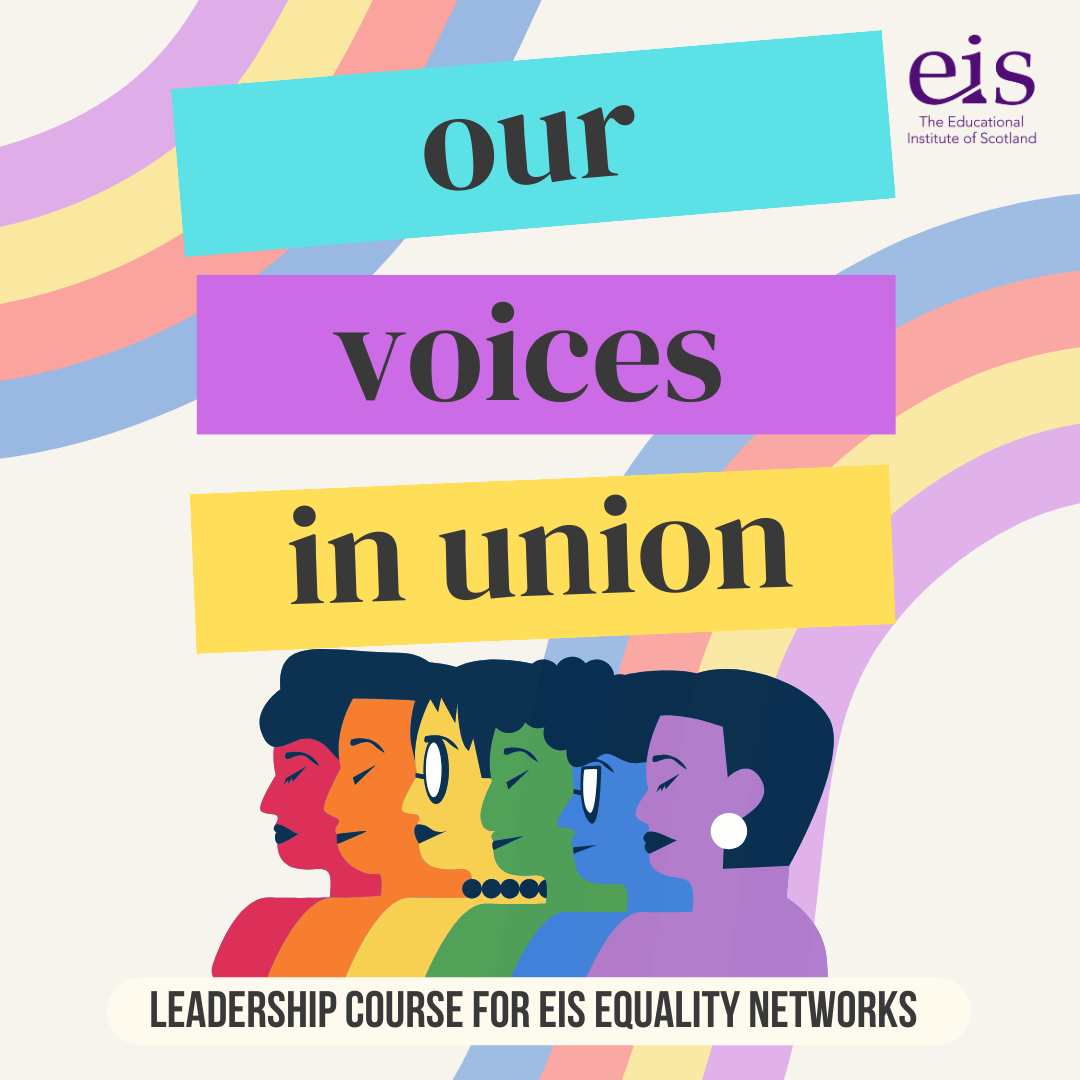
The EIS continues to work towards a diverse, inclusive education system, and equitable workplaces for all. Since 2020, the EIS has worked on expanding our equality activism, including growing informal equality networks for groups who are underrepresented in the union and in education; LGBT, disabled and BAME workers.
In this learning series we will explore a range of key equality topics of current interest to the EIS. Please note that this content was originally designed for EIS Equality Reps, and therefore some of the videos and content addresses Equality Reps specifically.
These pages are intended as a starting point for your learning – we look forward to seeing where it takes you thereafter!
You should choose at least two topics to focus on for your studies. You are encouraged to choose two topics with which you are less familiar.
Gender equality is an important component to EIS’s equality work. As a Union, we represent over 80% women.
This topic will talk about gender equality at work, through looking examining the gender pay gap.
The expert video is provided by Equality, Diversity and Inclusion Trainer Ellie Muniandy.
During the establishment of the EIS Disabled Members Network in 2021, members noted the need for improved understanding of autism in the workplace and support for autistic workers.
In this topic, we will draw on work undertaken by an EIS focus group of autistic members and a related small-sample survey.
We will look at increasing knowledge and understanding of autism and facilitate proactive changes that can make workplaces more equitable for autistic workers.
The work of the Autism Appropriate Workplaces Focus Group informed several EIS learning events and is intended to culminate in the publication of guidance for Reps on this topic.
The expert videos are provided by Marion McLaughlin, CEO of Autism Understanding Scotland.
Reasonable adjustments are an essential right in the pursuit of Fair Work for disabled workers.
This topic will provide the opportunity for you to reflect on the importance of reasonable adjustments, consider some of the challenges that may exist, and how to overcome them.
The expert video is provided by Sally Witcher, freelance trainer and former Chief Executive of Inclusion Scotland.
The EIS has played an essential role in the planning and implementation of LGBT education in Scotland. The EIS affiliated with the TIE campaign in 2017 and EIS members have been involved with leading the work on designing resources and curricular plans for LGBT+ inclusive education.
The EIS has an LGBT informal network, and LGBT sub-committee, which feed directly into the work of the EIS Equality Committee, and advises on LGBT issues. In 2023, EIS published “The Power of LGBT inclusive Education”, with advice on how members can take this forward.
The expert video for this topic is provided by Co-Founder and Director of Time for Inclusive Education, Jordan Daly.
The EIS has a strong commitment to anti-racism, and a longstanding track record of tackling discrimination and harassment within the workplace and in education.
Over the last three years, we have grown our anti-racist work, started a national EIS BAME network, and continued chairing the Diversity in the Teaching Profession and Education Workforce, a Scottish Government subgroup to the Anti-racism in Education Programme.
As part of this learning topic, you will consider how racism may manifest for people of colour, and how we can have braver conversations about racism.
The learning video for this topic is provided by Equality, Diversity and Inclusion trainer Ellie Muniandy.
The EIS was established with a collective resolve for the promotion of sound learning and for the benefit of teachers. Our vision is an education system, that is properly resourced, with social justice, equity, inclusion, equality and diversity at the heart, and in which the professionalism of teachers is truly respected.
Unfortunately, recent years have witnessed a rise in the far-right narratives within the mainstream, that seek to scapegoat marginalised and minoritized people and undermine our collective efforts for the betterment of all.
It is more important than ever, that we mobilise for the equality agenda. To do so, we need effective social media approaches, and counter-narratives.
In this topic, we will explore some of the ways in which effective social media and counter narratives can advance a progressive society, and you will be encouraged to reflect on communication strategies that can win against the far-right.